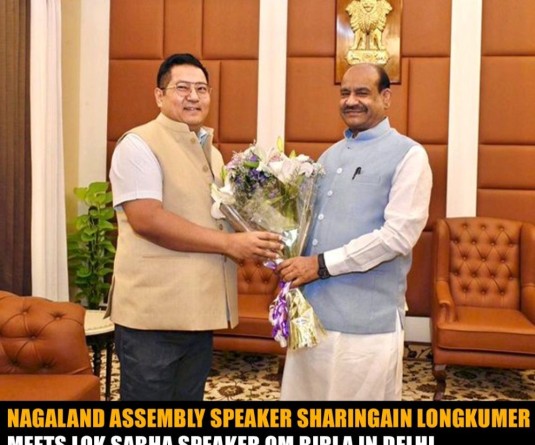
WSK charges Nagaland govt of ‘shifting responsibility’
Dimapur, October 19 (MExN): The Western Sümi Kukami (WSK), on October 19, charged the present Government of Nagaland of “clearly shifting its responsibility” to the public, instead of upholding previous government orders in connection with the conflict between Kiyevi and Lamhainamdi villages.
“Such situational circumstances created the foundation of hatred and more tribalism within the divided Naga Society,” and is “unbecoming of person holding chair of responsibility,” stated the WSK in a press release issued by its Media Cell.
In this connection, it called on the State government to “implement Eviction Order NO.CNG-1/45/COM/KHEHOI/2018/785, Dated Kohima, the 8th July, 2019,” failing which it would “strongly stand and work collectively” with the Western Sümi Youth Front (WSYF) to ensure that justice is done.
According to the WSK, starting with the establishment of Kiyezu village in 1911, the Western Sümi area has expanded to include 174 villages under its jurisdiction.
“Kiyevi Village was established in the year 1939 during the British era when no boundaries existed and when there was no district called Peren as of what it is today. During those days different tribes had dwelled in that area, including both Nagas and Non-Nagas but mostly they were Non-Nagas who resided and cultivated in the lands owned by Sümis by paying taxes,” it maintained.
In year 1945, “the friendly people- Lothavi, Kiyevi and Puti without any hassle or issues demarcated the boundary between Kiyevi village (Sümi) and Lamhai village (Zeliang)” and the people of two tribes had been co-existing peacefully for the past 79 years, it added.
However, the WSK claimed that the Lamhai Village Council issued an authorisation (NOC) to the “people of Zeliangrong community for setting up a new village within the land that falls under Kiyevi Village” on September 4, 2018 and named it as ‘Lamhainamdi’ and claimed it as their traditional or ancestor land.
“This has further led to the present ongoing conflicts between two peace-loving tribes, due to the vested interest of a few individuals playing behind the scene,” it contended.
As per the release, when the issue came to light, the State government immediately issued two separate orders which were to maintain a status quo on June 25, 2019 and eviction order on July 8, 2019, to avoid any further law and order deterioration in the area, “as it was evident that it was clear case of encroachment of Kiyevi village jurisdiction.”
However, instead of implementing these orders and solving the issue, the State government has been avoiding responsibility and diverting the case by inviting 14 tribes to mediate the case of eviction orders, WSK claimed.
The 14 tribes declined to mediate “on the ground that the land conflict is between 2 tribes” but the government on October 6, 2022 invited the Central Nagaland Tribes Council (CNTC) and Tenyimi Public Organisation (TPO), to find an amicable solution, it informed.
Against this backdrop, it maintained that government has been shifting its responsibility instead of upholding the previous Government orders.
The WSK went on to state that the Sümi Hoho, the apex body of Sümi tribe and its frontal organisations have been trying to maintain a peaceful and harmonious relationship with every Naga tribe.
Similarly, the “Western Sümi frontal organisations are also trying our best to live in peace and tranquillity with all our Naga brothers and sisters,” it maintained, citing examples of regular co-ordination meetings with other tribal organisations to “sow seeds of brotherhood.”
Accordingly, it accused the government of creating a “State filled with tribalism by inviting other organisations without understanding the actual facts on the ground” amidst the Naga Freedom Fighters declaration of ‘Nagaland for Christ’ and trying their best in every possible way to bring a solution for the Nagas.
The government’s inability to lead its people in a rightful may take the coming generation backward, the WSK added.
According to the WSK, the state government has directly declared the issue between two tribes as disputed land “but this is not a disputed land as it truly and purely belongs to the people of Kiyevi village.” “The government is not ignorant of this fact but trying to ignore it, in spite of issuing eviction orders.”
As such, it noted that while the community is trying is best to avoid “any unwanted incident,” their “perseverance and faith in government have been wrongly taken for granted,” and reminded that the ultimatum served to the state government by WSYF on September 21, 2022 had expired on October 13.
“But we are yet to receive any positive news from the state government to pro-actively defuse the situation, as now more encroachments are taking place in spite of deployment of IRB to avoid any new settlements,” it claimed.
In case the government fails to implement the July 8, 2019 eviction order “whatever incident it may cause to the public, the government will be solely responsible for it as we are left with no choice...,” it asserted.





